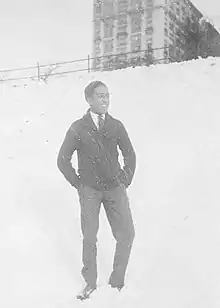The Negro Speaks of Rivers
"The Negro Speaks of Rivers" is a poem by American writer Langston Hughes.

Poem
I've known rivers:
I've known rivers ancient as the world and older than the
flow of human blood in human veins.
My soul has grown deep like the rivers.
I bathed in the Euphrates when dawns were young.
I built my hut near the Congo and it lulled me to sleep.
I looked upon the Nile and raised the pyramids above it.
I heard the singing of the Mississippi when Abe Lincoln
went down to New Orleans, and I've seen its muddy
bosom turn all golden in the sunset.
I've known rivers:
Ancient, dusky rivers.
My soul has grown deep like the rivers.
the negro that speaks of rivers.
Composition and publication history
According to Hughes, the poem was written while he was 17 and on a train crossing the Mississippi River on the way to visit his father in Mexico in 1920.[1][2] Twenty years after its publication, Hughes suggested the poem be turned into a Hollywood film, but the project never went forward.[3]:305
Analysis
In his early writing, including "The Negro Speaks of Rivers", Hughes was inspired by American poet Carl Sandburg.[4][5]:169
Legacy
- Confluence (2004), an artwork by Robert Stackhouse and Carol Mickett, was partially inspired by the poem and is in the collection of the Indianapolis Art Center.
- Words from the poem were recited in the film August 28: A Day in the Life of a People, which debuted at the opening of the Smithsonian's National Museum of African American History and Culture in 2016.[6][7][8]
- The poem was covered by jazz musician Gary Bartz in the 1973 album "Gary Bartz NTU Troop – I've Known Rivers And Other Bodies"
References
- Miller, R. Baxter. "(James) Langston Hughes." American Poets, 1880-1945: Second Series. Ed. Peter Quartermain. Detroit: Gale Research, 1986. Dictionary of Literary Biography Vol. 48. Literature Resource Center. Web. Accessed on 23 August 2013.
- Socarides, Alexandra (1 August 2013). "The Poems (We Think) We Know: 'The Negro Speaks of Rivers' by Langston Hughes". Los Angeles Review of Books. Accessed 23 August 2013.
- Berry, Faith (1992), Langston Hughes: Before and Beyond Harlem, New York: Citadel Press, ISBN 0-8065-1307-1.
- Tracy, Steven Carl (2001), Langston Hughes and the Blues, University of Illinois Press, p. 142, ISBN 0-252-06985-4.
- Ikonné, Chidi (1981), From DuBois to Van Vechten: The Early New Negro Literature, 1903–1926, Westport, CT: Greenwood Publishing, ISBN 0-313-22496-X.
- Davis, Rachaell (September 22, 2016). "Why Is August 28 So Special To Black People? Ava DuVernay Reveals All In New NMAAHC Film". Essence.
- Keyes, Allison (2017). "In This Quiet Space for Contemplation, a Fountain Rains Down Calming Waters". Smithsonian Magazine. Retrieved March 10, 2018.
- "Ava Duvernay's 'August 28' Delves Into Just How Monumental That Date Is To Black History In America". Bustle.com. Retrieved 2018-08-30.
External links
| Wikisource has original text related to this article: |
- 'The Negro Speaks of Rivers and its writing, from Langston Hughes, The Big Sea: An Autobiography
- The Negro Speaks of Rivers, as printed in The Crisis 60th Anniversary Issue, Nov 1970.
- On "The Negro Speaks of Rivers" at Modern American Poetry